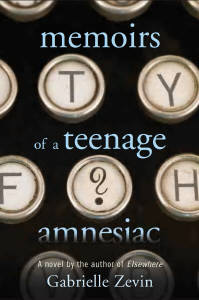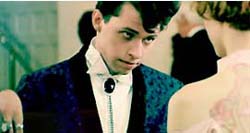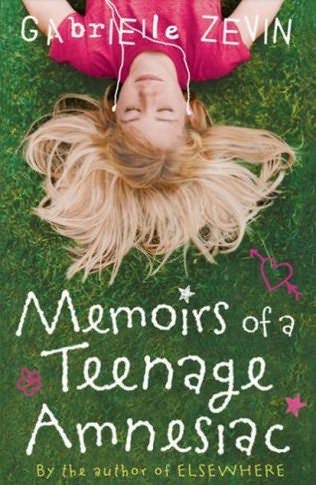Seven Impossible Tri-Reviews Before Breakfast #2: Featuring Jen Robinson and Memoirs of a
Teenage Amnesiac
 September 20th, 2007 by Eisha and Jules
September 20th, 2007 by Eisha and Jules

by Gabrielle Zevin
Farrar, Straus and Giroux
September 2007
(advance reading copies)
Note: The U.S. cover is pictured here;
the U.K. one, below
We’re here to discuss Gabrielle Zevin’s second YA novel, her first one being 2005’s Elsewhere (Farrar, Straus and Giroux), a 2006 ALA Notable Book and a Quill Book Award nominee, in which the afterlife is portrayed as a place where its inhabitants age in reverse until they reach infancy and are then sent back to Earth and reborn. She has also written one book for adults, Margarettown, and several screenplays.
In this novel, we meet seventeen-year-old Naomi, who takes a tumble down her high school steps one day after losing a coin toss with her best friend and co-editor of the yearbook, Will, over who should go back into the building to get the yearbook’s camera. She wakes to find that the past four years of her memory have been wiped clean and that she’s being assisted in the ambulance by a rather handsome fellow student about whom she knows nothing. Thus begins her journey of self-discovery as she tries to put back the puzzle pieces of her life, trying to remember Ace, her boyfriend; the complicated relationship she had with Will; why her parents are divorced; and why it takes her father a good while to tell her he’s now engaged. There’s also the issue of her mother’s new family, including a half-sister Naomi doesn’t remember at all.
We’re happy to host Jen Robinson for this, our second tri-review, the first one being fairly recently with Betsy Bird of A Fuse #8 Production and linked here, if you missed it. It was a pleasure to chat with Jen about this book. She’s a very astute reader, that one. Not to mention she graciously put up with our busy schedules while this was composed (we started this review one month ago!).
Watch Out: Some spoilers in the review below . . .
Jules: Jen, we’re excited to have you tri-reviewing with us! What did you think of the novel? I, for one, really enjoyed it, though I admit it took some convincing for me to swallow the premise. I was scared of the whole amnesia set-up – in a this-is-a-bad-soap-opera-narrative kind of way. But kudos to Zevin for making it work. It quickly became entirely believable for me, and I was really wrapped up in what I thought were such honest and perceptive characterizations. And, of course, Zevin is using memory loss as a way to explore issues of – the very nature of – identity; I guess making it a temporary and partial amnesia worked better for me. A full-fledged one might have been harder to swallow. And, though I’m getting ahead of myself here, I found the ending to be pitch-perfect and perfectly charming. Yes, I used the over-rated “charming” in a review, but it really fits here.
Did you like it? And how did it compare to Elsewhere for you? I have yet to read that one, though the premise sounds fabulous to me.
Jen: First of all, thanks so much for including me in this tri-review. I’ve never done any kind of co-reviewing, and I’m intrigued by the possibilities. Reviewing is ordinarily such a solitary activity.
To answer your question, yes, I did enjoy Memoirs of a Teenage Amnesiac. I thought that the premise was fascinating – I wanted to read it as soon as I heard about it (I guess I have a weakness for soap-opera storylines). I read the book in a single sitting. Like you, one thing that really stood out for me was Zevin’s characterization. Zevin goes much deeper than just discussing how people look. She uses how they look and act to explore their deeper foibles and insecurities. For example:
Will removed his black rectangular-framed glasses and wiped them on his pants. I would later learn that removing his glasses was something Will did when embarrassed, as if not seeing something clearly could in some way distance him from an awkward situation. (Chapter 1)
It’s as if each character, even the minor characters, is put under a microscope, with almost painful intensity. I will admit to enjoying the ending somewhat reluctantly, because I’m a bit burned out on stories about best friends of the opposite gender, and whether they end up together or not. But I thought that Zevin handled it well, and managed to keep the end from being predictable throughout the story. It takes a skilled writer to take well-trodden premises, and make them fresh (both the amnesia storyline and the best friend storyline).
I think that Zevin’s writing is top-notch, with the right mix of plotting and introspection, as well as flashes of humor. To compare Zevin’s two books, I think that the premise in Elsewhere is more original, but that the characterization is deeper in Amnesiac. I personally still prefer Elsewhere, but I think that the writing is probably better in Amnesiac.
How about you, Eisha? Did you enjoy the book? Did you think that Zevin kept the premises fresh and interesting? Did you like the ending?
 eisha: I did enjoy the book. I read a few pages of Elsewhere when it first came out, but never got around to actually reading it, so this is my first encounter with Zevin’s writing. And I thought it was very strong – you’re right, she’s great with characterizations, she keeps a good balance between drama and humor, and she doesn’t overdo it with the best-friends-but-could-they-be-more? tension. I really liked Will – he was such a Duckie, wasn’t he?
eisha: I did enjoy the book. I read a few pages of Elsewhere when it first came out, but never got around to actually reading it, so this is my first encounter with Zevin’s writing. And I thought it was very strong – you’re right, she’s great with characterizations, she keeps a good balance between drama and humor, and she doesn’t overdo it with the best-friends-but-could-they-be-more? tension. I really liked Will – he was such a Duckie, wasn’t he?
I also really liked the premise, particularly because of how Zevin was able to use it to delve into the theme of identity (as you mentioned, Jules) and how it’s defined by past experiences and other people’s perceptions. When Naomi loses the last four years of her memory, she loses those touchstones we all take for granted. The expected – maybe clichéd – reaction would be for her to attempt to recreate her previous life with whatever clues she can gather, and get back to “normal” as soon as possible. But instead, Naomi gets frustrated with everyone’s expectations of her, and takes off in the other direction. Her inability to remember how she got to this point in her life becomes an opportunity for her to reevaluate herself, her relationships and her interests without the usual baggage that everyone accumulates over time. I thought it was a fresh approach to the amnesia storyline, and one that worked very well.
And yes, I liked the ending. I liked that it wasn’t some big dramatic scene – I thought it felt natural, and perfectly in keeping with the relationship between Naomi and Will. How about you, Jules? You already mentioned you liked it – what about the story, and the ending, made it so “pitch-perfect” for you? And was there anything you think could have been better?
 Jules: Word to the natural, Eisha. I liked that, at the book’s close, Naomi’s epiphany about Will wasn’t forced – and neither was the notion that they will, without any question, necessarily live happily ever after. She left us a nice, big, lovely question mark, yet left us feeling reassured that Naomi finally recognizes true devotion when she sees it – and understands that the person who really loves you is “the person who wants to know all your stories.” (And did we perhaps get foreshadowing of this in the beginning with his letter to her, in which the “U” key on his old typewriter came down every time he pressed the “i”?) . . . And let’s not forget what she learned beyond Will – that perhaps life is “{o}ne orphaning after the next . . . have a suitcase heart, be ready to travel.” I liked that.
Jules: Word to the natural, Eisha. I liked that, at the book’s close, Naomi’s epiphany about Will wasn’t forced – and neither was the notion that they will, without any question, necessarily live happily ever after. She left us a nice, big, lovely question mark, yet left us feeling reassured that Naomi finally recognizes true devotion when she sees it – and understands that the person who really loves you is “the person who wants to know all your stories.” (And did we perhaps get foreshadowing of this in the beginning with his letter to her, in which the “U” key on his old typewriter came down every time he pressed the “i”?) . . . And let’s not forget what she learned beyond Will – that perhaps life is “{o}ne orphaning after the next . . . have a suitcase heart, be ready to travel.” I liked that.
I’d like to add that I loved the bit of humor traced throughout the book, especially that Naomi didn’t take her predicament too seriously. Well, of course, it was very serious stuff, but she knew how to find humor in her situation as well – and so did Will. And I am a big ‘ol sucker for discussions of the Art of a Good Mixed Tape (CD, in this case – yes, obviously I went to high school in the ‘80s) and mixtape culture, if you will (according to Wikipedia, it’s “mixtape” – who knew), such as in Nick Hornby’s High Fidelity. I loved Will’s brief manifesto on the issue, how he was speaking so fast and passionately about it (probably since I think a well-thought-out mixed CD for someone is just about the best gift ever). I just looked it up on page 9 of our copies:
It’s hard to make a good mix. You don’t want anything too cliché, but you don’t want to make the songs too obscure either. Plus, you can only fit about nineteen tracks on a CD, and you want each one to say something different, and you want a balance of slow and fast songs, and then there’s the added pressure of making sure each track organically leads to the next. Plus, you’ve got to know the person for whom the mix is intended really well. For example, on yours each of the songs means something. Like the first one is sort of how we met freshman year. I thought it might jog your memory.
Puddin’ head. Love him. And he wore a powder blue tuxedo to the prom? Love him even more.
Oh, and two more things — when Naomi imagines her and Ace’s conversation as a version of Waiting for Godot, as Ace goes on about the stoned guy on the trampoline (with the line directions “And repeat. Endlessly, endlessly repeat” at the end) was funny stuff. And I laughed out loud at Will’s statement about James: “Not all of us have the luxury of being so exquisitely depressed.”
And, on that note and to address another of the book’s big strengths, I like how Zevin avoided painting anyone too one-dimensionally. Sure, Ace was a big “jock,” but he wasn’t entirely insensitive. And James wasn’t 100% emo (though he was mostly so). And Naomi’s mother wasn’t entirely evil. And how Naomi had to re-learn all that, figure that all out for herself (eventually coming to see that “{i}f you don’t know something for yourself, you just can’t be sure”) – as well as re-evaulate everything in her life (“if my memory never came back, maybe it was as easy as asking myself what I liked and what I didn’t like”) without contamination, if you will, from her previous life — made for a captivating read.
I don’t know that I’d have any suggestions for improvement, Eisha. I thought it was a well-crafted novel. What about you, Jen? And do you agree that the occasional light-hearted tone was a nice counterbalance to the intensity of Naomi’s situation, or did you find it distracting, by chance?
 Jen: Will was definitely a Duckie, Eisha. And I agree with your point about the premise giving Naomi an opportunity to re-evaluate herself, without baggage. It’s a weird thought that you could wake up one day, four years after your latest memory, and not approve of the person that you’ve become. A uniquely adolescent theme, I think, because teens can change so much in a short period of time (and, of course, because teens are all about figuring out who they really are). [This theme is also explored in Trigger, by Susan Vaught (which I reviewed here). In the case of Trigger, the amnesia is a result of a self-inflicted bullet to the head, and the things that the protagonist has to re-learn about himself are quite a bit more negative than Naomi’s experiences.]
Jen: Will was definitely a Duckie, Eisha. And I agree with your point about the premise giving Naomi an opportunity to re-evaluate herself, without baggage. It’s a weird thought that you could wake up one day, four years after your latest memory, and not approve of the person that you’ve become. A uniquely adolescent theme, I think, because teens can change so much in a short period of time (and, of course, because teens are all about figuring out who they really are). [This theme is also explored in Trigger, by Susan Vaught (which I reviewed here). In the case of Trigger, the amnesia is a result of a self-inflicted bullet to the head, and the things that the protagonist has to re-learn about himself are quite a bit more negative than Naomi’s experiences.]
Jules, I agree with you about the character of Ace not being too one-dimensional. Though, if we’re looking for weaknesses, I’m not sure it was ever entirely clear why Naomi would have been with him in the first place. But that’s a minor point – it’s certainly a better story if Naomi has a boyfriend who she can’t even remember, and Ace couldn’t be perfect for her, since the reader is meant to be pulling for Will. (Fascinating notion about the foreshadowing in the typewriter letters). I have no other thoughts toward improvement.
And I loved the counter-balance of the light-hearted passages. I’m always more in favor of a book that can make me laugh sometimes. A great book can make you laugh and cry on the same page. Here’s a small passage that I flagged: “I was in the hospital for three more nights. A rotating coven of evil nurses would wake me up every three hours or so by shining a flashlight in my eyes.” (page 24).” I love these throw-away bits of humor.
A couple of other positives:
- I liked the relatively casual way that Zevin throws in Alice’s sexuality – it’s a trait of her character, but not an “issue.”
- I liked the sub-theme around people discovering the things (and people) that they are passionate about. “This was passion! … It was what I’d heard when Alice spoke about the play, or when Will spoke about yearbook, or Dad about Rosa Rivera.” (page 132) . . . Part of Naomi figuring out her identity is figuring out that this is what she wants for herself – to spend time on the things that arouse her passion.
- One other sub-theme that caught my eye was the importance of pauses in conversation. It’s not just words that matter, but the silences between them, and the atmosphere during those silences. This is a fitting motif to have in a book about amnesia, where the silences are, sometimes, analogies to the gaps in Naomi’s memories.
What do you think about these last points, Eisha? Did you notice any of them, or am I reading into the book?
eisha: No, you’re not reading too much into it, I think you’re spot on. And I really love the observation about the importance of silences. We’re clued in to that early on, with the pause James takes when Naomi asks about what he said in the ambulance; and again when Will visits Naomi in the hospital and she doesn’t recognize him (the excerpt you included above, Jen, in the first block quote about him removing his glasses). Often the pauses come from other characters as they decide how much to tell Naomi about what she doesn’t remember, and the fact that she’s reliant on others to be honest with her about the past serves to highlight how vulnerable she is in her amnesiac state.
As far as why Naomi was with Ace, the only real clues we get are in what Will said
(“…you go to a school where it’s not entirely a bad thing to have a boyfriend like Ace”), and the easy rapport that they show towards the end when they become tennis partners. I think Ace was comfortable for her when she was the kind of girl who kept track of her calorie intake in her diary, but clearly not one of her “passions.”
I also love that observation about the typewriter letters. Very astute, Julie-san. But what do you think about Naomi and Ace? Did you buy it?
Jules: Yes, I bought it. Jen brings up a great point, but I suppose I thought of it in the same way that Eisha did – that is, I was pretty convinced that, sure, it wasn’t an entirely bad thing to have a boyfriend like him at their school, as Will put it. If her boyfriend had been more Will-like (as Jen already pointed out) or, rather, more similar to the Naomi who woke up, if you will, who was discovering her passions, it wouldn’t have been half as interesting, I think, to read about her very search for that passion and for the one person who was a true fit for her. That tension and juxtaposition worked for me.
Wow, you all are making me want to read the novel again. I think I’m done and that we’ve covered a lot of the book here. I am pleased to have read my first Zevin novel and really look forward to backtracking and reading Elsewhere. And I suppose we can point out here for interested readers that both of our blogs have interviews with Zevin lined up for the near future.
Jen and Eisha, anything else you want to add? I don’t mean to end the conversation if you all have more to say. By all means, keep going if you’re so inclined. As for me, that’s my story and I’m stickin’ to it — and this was fun, so thanks again, Jen!
Jen: I’d just like to add that I look forward to future books from Gabrielle Zevin. I think she has a real knack for coming up with interesting premises. And the fact that she’s spot-on with her characterization helps, too. When you have characters that readers care about, and you put them in captivating situations – that’s a winning combination. Thanks so much for having me, Jules and Eisha. This was a lot of fun.
eisha: Nah, thank you, Jen! It was a pleasure hanging with you. Let’s definitely do this again sometime – maybe for Zevin’s next book . . .

Wow — truly thought-provoking discussion here. One thing that adding an extra person (Hi Jen!) into the mix does is make it feel more like there are whole communities of people out there who have read and thought about books. Somehow, a three-way dialogue makes me more curious to read the book. Huh.
I’ve just added this to the “books to by for the library after we have our next book sale” list…It’s so nice to be able to buy books I want to read without spending my own money…
thanks for the review!
Thanks so much, J&E. I’m very pleased with how this turned out. I know that I thought about the book more than I would have if I just sat down and wrote my own review in one sitting.
Love that you went and found a picture of Duckie, too. Way excellent! And yes, I would love to do it again sometime, Eisha.
Hi Kelly and Charlotte. Thanks for making your way through our rather lengthy review.
I love these tri-reviews. I agree with Kelly, this conversation style reviews really add to my curiousity about the book. I’ll definitely put it on my list to read. Thanks!
[…] 2006); Someday This Pain Will Be Useful to You by Peter Cameron (Farrar Straus Giroux, 2007); Memoirs of a Teenage Amnesiac by Gabrielle Zevin (Farrar Straus Giroux, 2007); and Get Well Soon by Julie Halpern (Feiwel & […]
[…] Memoirs of a Teenage Amnesiac, by Gabrielle Zevin (seven impossible things before breakfast) (tags: gabrielle.zevin memoirs.of.a.teenage.amnesiac young.adult romance identity memory friendship) […]